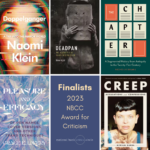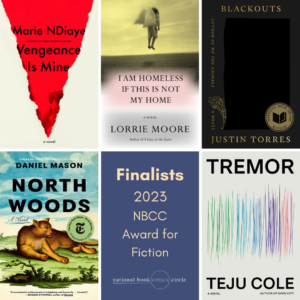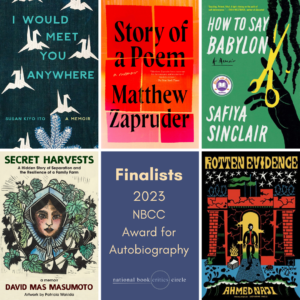The latest from the National Book Critics Circle, including links to our members’ latest reviews, awards info and all things NBCC related.
News & Notes
Announcements
April 22, 2024
Reviews and More From NBCC Members
By Michael Schaub
Friends, we hope you’re having a good spring! Our members have been keeping busy with reviews of books by authors including Doris Kearns Goodwin, Alexandra Fuller, Judith Butler, Hampton Sides,... Read More
-
March 21, 2024
AwardsNATIONAL BOOK CRITICS CIRCLE ANNOUNCES WINNERS FOR PUBLISHING YEAR 2023
By Members Of The National Book Critics Circle Board
-

February 29, 2024
30 Books30 Books in 30 Days: Criticism
By Members Of The National Book Critics Circle Board
-
January 25, 2024
AwardsNATIONAL BOOK CRITICS CIRCLE ANNOUNCES FINALISTS FOR PUBLISHING YEAR 2023
By Members Of The National Book Critics Circle Board
Members Only
To access member news, please login as a member or join the NBCC!
Critical Notes
-

April 22, 2024
Reviews and More From NBCC Members
By Michael Schaub
Friends, we hope you’re having a good spring! Our members have been keeping busy with reviews of books by authors including Doris Kearns Goodwin, Alexandra Fuller, Judith Butler, Hampton Sides,... Read More
-

April 15, 2024
Reviews and More From NBCC Members
By Michael Schaub
Members and friends, we hope you’ve been having a good spring! Our members have been busy with reviews of books by authors including Becca Rothfeld, Stephen Graham Jones, Julia Alvarez,... Read More
-

April 8, 2024
Reviews and More From NBCC Members
By Michael Schaub
Friends, we hope you’re having a good spring! Our members have been keeping busy with reviews of books by authors including Henry Louis Gates Jr., Victoria Chang, Leif Enger, Rita... Read More
Criticism & Features
-

March 14, 2024
Members Of The National Book Critics Circle Board
30 Books
30 Books in 30 Days: FictionEach year, our board members write citations of the finalists for the National Book Critics Circle Awards in a feature we call 30 Books in 30 Days. We’re honored to... Read More
-

March 11, 2024
Members Of The National Book Critics Circle Board
30 Books
30 Books in 30 Days: PoetryEach year, our board members write citations of the finalists for the National Book Critics Circle Awards in a feature we call 30 Books in 30 Days. We’re honored to... Read More
-

March 7, 2024
Members Of The National Book Critics Circle Board
30 Books
30 Books in 30 Days: BiographyEach year, our board members write citations of the finalists for the National Book Critics Circle Awards in a feature we call 30 Books in 30 Days. We’re honored to... Read More
-

March 4, 2024
Members Of The National Book Critics Circle Board
30 Books
30 Books in 30 Days: AutobiographyEach year, our board members write citations of the finalists for the National Book Critics Circle Awards in a feature we call 30 Books in 30 Days. We’re honored to... Read More

